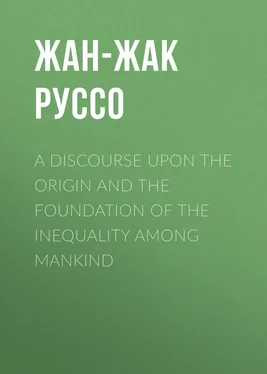The more we meditate on this subject, the wider does the distance between mere sensation and the most simple knowledge become in our eyes; and it is impossible to conceive how man, by his own powers alone, without the assistance of communication, and the spur of necessity, could have got over so great an interval. How many ages perhaps revolved, before men beheld any other fire but that of the heavens? How many different accidents must have concurred to make them acquainted with the most common uses of this element? How often have they let it go out, before they knew the art of reproducing it? And how often perhaps has not every one of these secrets perished with the discoverer? What shall we say of agriculture, an art which requires so much labour and foresight; which depends upon other arts; which, it is very evident, cannot be practised but in a society, if not a formed one, at least one of some standing, and which does not so much serve to draw aliments from the earth, for the earth would yield them without all that trouble, as to oblige her to produce those things, which we like best, preferably to others? But let us suppose that men had multiplied to such a degree, that the natural products of the earth no longer sufficed for their support; a supposition which, by the bye, would prove that this kind of life would be very advantageous to the human species; let us suppose that, without forge or anvil, the instruments of husbandry had dropped from the heavens into the hands of savages, that these men had got the better of that mortal aversion they all have for constant labour; that they had learned to foretell their wants at so great a distance of time; that they had guessed exactly how they were to break the earth, commit their seed to it, and plant trees; that they had found out the art of grinding their corn, and improving by fermentation the juice of their grapes; all operations which we must allow them to have learned from the gods, since we cannot conceive how they should make such discoveries of themselves; after all these fine presents, what man would be mad enough to cultivate a field, that may be robbed by the first comer, man or beast, who takes a fancy to the produce of it. And would any man consent to spend his day in labour and fatigue, when the rewards of his labour and fatigue became more and more precarious in proportion to his want of them? In a word, how could this situation engage men to cultivate the earth, as long as it was not parcelled out among them, that is, as long as a state of nature subsisted.
Конец ознакомительного фрагмента.
Текст предоставлен ООО «ЛитРес».
Прочитайте эту книгу целиком, купив полную легальную версию на ЛитРес.
Безопасно оплатить книгу можно банковской картой Visa, MasterCard, Maestro, со счета мобильного телефона, с платежного терминала, в салоне МТС или Связной, через PayPal, WebMoney, Яндекс.Деньги, QIWI Кошелек, бонусными картами или другим удобным Вам способом.












